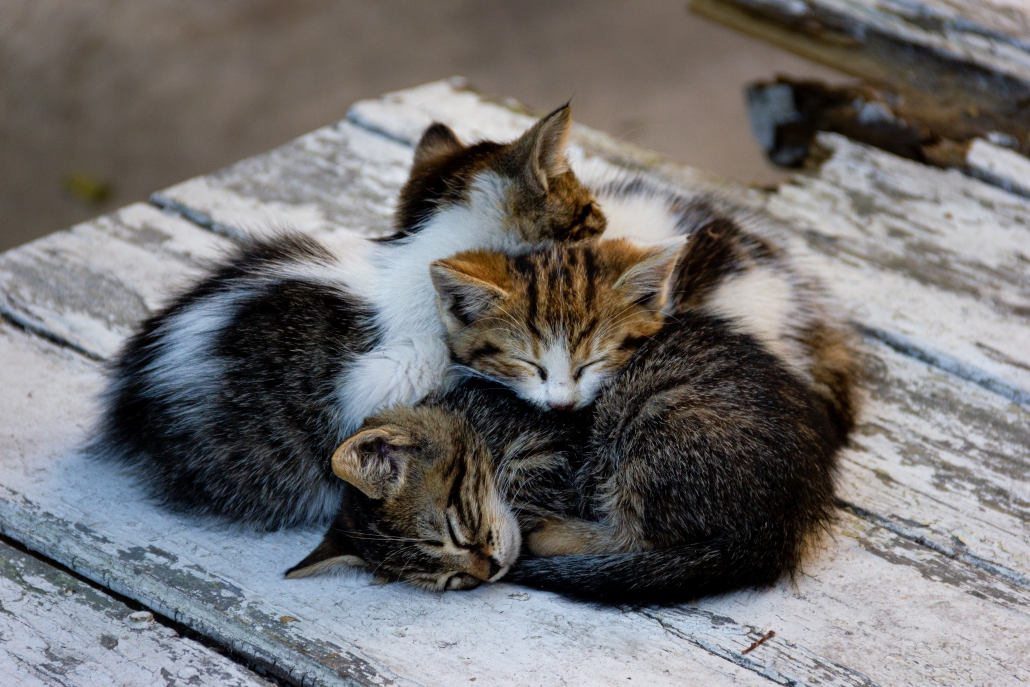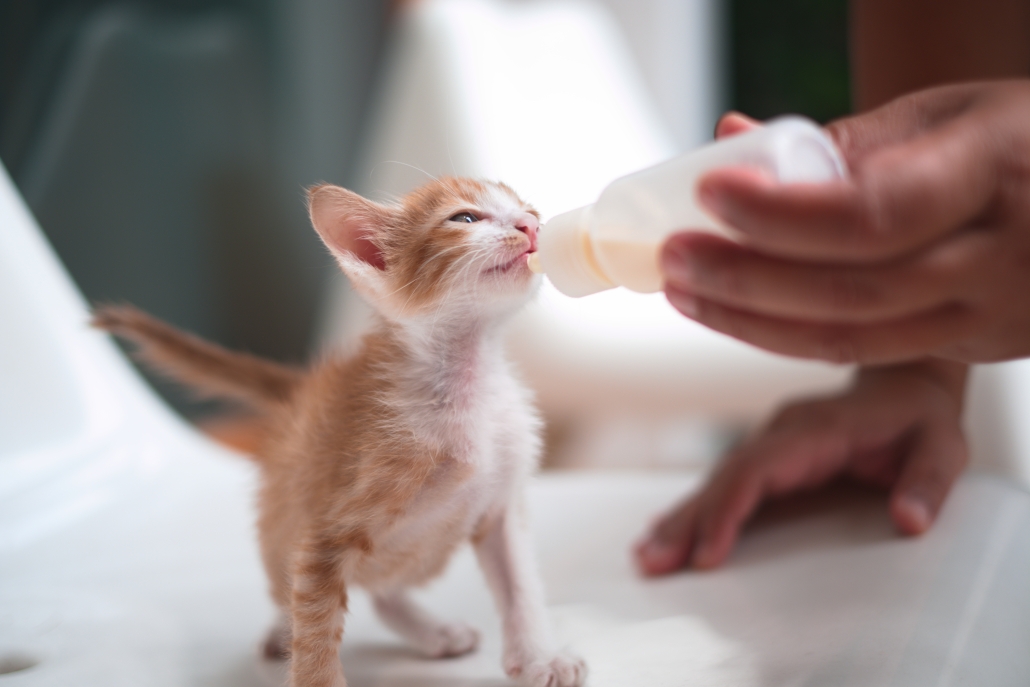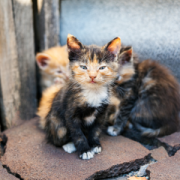Discovering a litter of kittens outdoors can evoke a mix of emotions – concern, compassion, and sometimes confusion about the best course of action. It can be tempting to scoop them up and bring them indoors, but it’s important to understand what is (and what isn’t) in their best interest.
Cats can have litters any time of the year, but during the warmer months – typically March to October – cats are particularly prolific. An unspayed female can have anywhere from 2-4 litters per season, with an average of four kittens per litter. Given those statistics, it should be no surprise that shelters like NOCO Humane can expect to provide care to hundreds of newborn kittens every year. Here’s how you can help!
In the event you find stray kittens, there are several factors that may dictate your course of action, and we’ll talk through common scenarios to help guide you. First, determine if any of the kittens are visibly sick or injured. If yes, call your local veterinary clinic for guidance, or take them there right away. Be sure to wear proper personal protective equipment (PPE) to avoid spreading disease, as kittens are considered “immunocompromised” until about six months old. Signs of sickness and injury include: thin stomachs and gaunt faces, visible ribs and spine; cold ears, bellies, and paws, which will appear pale pink, white, or yellow, or constant shivering; pale gums and tongue; lethargy/almost no movement; excessively crusted eyes or nose; diarrhea or vomiting; struggling to breathe; limping; and visible wounds or sores.
If the kittens appear healthy and intact, your next move is to determine if their mother is around. It’s best not to assume that the kittens are abandoned as their mother will temporarily leave the nest for good reasons, including looking for food. Kittens who are healthy and thriving with their mother outdoors do not need to be “rescued.” A mother cat’s instincts make her the best possible caregiver to her kittens, and give them the best chance at survival. Remember, mother knows best. No matter how many years of experience we may have with bottle-baby feeding and caring for kittens, we will never be able to match a mother cat’s instinctual care.
To determine if the mother is still around, wait several hours, or even a full day to see if she returns. Watch from a hidden spot or from inside so you don’t scare the mother away – your presence may keep her from returning to the nest.
Even if you don’t see the mother for a long time, check on the kittens periodically. If they are cuddled together and sleeping quietly, look pink, warm, and clean, and have full bellies, then their mother has very likely been back. Community cats are good at staying out of sight when they want!
Helpful tip: Sprinkle flour around the kitten’s nest, and if the mother returns, she will leave paw prints.

If the mother has returned, leave them be. You can help by ensuring they have regular food and water, an outdoor shelter for warmth and safety, and peace and quiet by discreetly checking on them regularly and not letting other cats, dogs, or pests nearby.
Unless the kittens and their mother are in immediate danger (natural disaster, in the road, etc.) or you’re concerned about extreme weather conditions rolling through, it’s best to leave them right where they are. Moving them into your home can further stress the mother cat, which can compromise her ability to properly and instinctively care for her kittens. If they do need additional protection, consider giving them a hard-shell carrier they can use as a hiding place. If absolutely necessary, move them to a quiet and small room in your home.
Helpful tip: a kitten’s ideal body temperature is 100 to 102 degrees Fahrenheit. If it’s appropriate to move move kittens into your home, consider a pet-approved heating pad in a hard shell carrier, and cover the carrier with a blanket to protect from drafts.
If you have reason to believe the mother is no longer around, step in to help. If you are able to care for them yourself, that would be much appreciated! Call your local veterinary office or animal shelter for guidance to determine how old they are and to ensure you have the proper supplies on hand. Neonatal kittens (four weeks old and younger) will need special supplies and round-the-clock care to survive. Dependent on their suspected age, they may require feedings every 2-6 hours, and need stimulation to empty their bladder and bowels after each feeding.
Helpful tip: contrary to popular belief, cow’s milk does not contain the appropriate nutrients for young kittens, and may even cause severe diarrhea. When feeding kittens, always use kitten milk replacement (KMR) at a ratio of one part formula to two parts water.
If you are unable to provide this level of care, consider a friend or neighbor who may be available to provide care, or you can take them to a local animal shelter. Many animal shelters facilitate foster care programs, allowing shelter animals who are not yet ready for adoption or need round-the-clock care to live in a temporary, loving home.
This is another area where you can help! To help create a safety net for neonatal kittens who arrive at our shelter, NOCO Humane is always looking for more Foster Care Volunteers to open their hearts and their homes to animals in need. Led by a team of supervisors and coordinators, all foster volunteers are provided with the necessary supplies, information, and training needed to care for these precious babies. “Being able to see a pet in need blossom right in front of you is an incredible journey to be part of. It truly is a life-saving program.” – Alice Hamlin, Foster & Transfer Coordinator.
Interested in becoming a Foster Care Volunteer? Click here to learn more and sign up.

While encountering a litter of kittens outdoors can stir a range of emotions, patience and thoughtfulness are our greatest allies. Remember, mother knows best and provides the best chance at her kittens’ survival. We realize that not every situation is alike, so please feel free to contact NOCO Humane with questions or concerns – 970.226.3647. Thank you for taking great care of homeless animals in your community!





